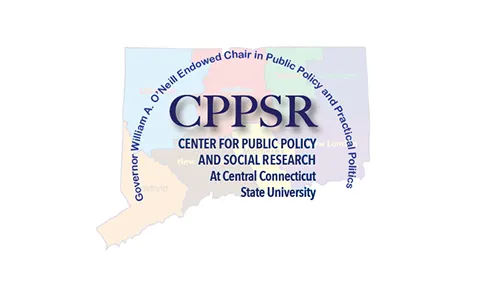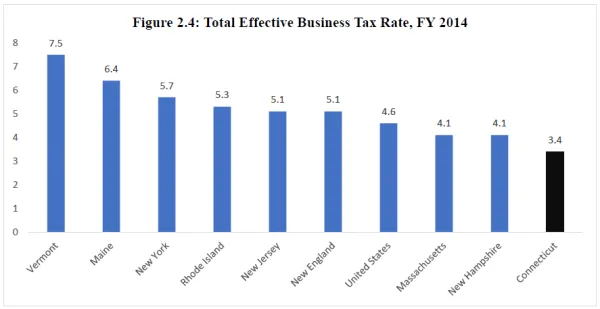CCSU Economists Report Finds Connecticut has Lowest Effective Business Tax Rate in the United States

Economists from the non-partisan Center for Public Policy and Social Research released a report on Wednesday on Connecticut’s business tax advantages, economic strengths, and quality of life perceptions. Their findings directly challenged perceptions portrayed by some special interests and elected officials about Connecticut’s business tax climate and the satisfaction of Connecticut’s residents about where they live.
Like most states, Connecticut suffered significant economic damage from the Great Recession of 2007-2009, and like many states, that damage continued well into the recovery. Real total gross domestic product decreased until 2014, but finally rebounded in 2015. Likewise, the unemployment rate rose until October 2010 before it descended to 4.5% by January 2017.
Throughout this period of recovery, public dialogue surrounding the health and performance of the Connecticut economy has been largely negative. Business advocates and elected officials allege that the state has irreversibly entered a period of long-term stagnation, declining quality of life, deteriorating economic competitiveness, and a shrinking population. They cite a hostile business climate, a burdensome tax structure and an uncoordinated, undisciplined state budget.
Though these negative perceptions are often anecdotal, limited and very selective, they alone can be very damaging for the economy regardless of the state’s fundamentals. If an economy’s participant institutions are convinced that it is already languishing, they respond by disinvesting, which actually does bring about decline.
A full analysis of Connecticut’s economic strengths and competitive advantages demonstrate that Connecticut holds significant advantages few states have, which reflect decades of public investment and hold substantial opportunities for future investment and economic growth:

- Connecticut has the lowest Total Effective Business Tax Rate in the United States
- Connecticut has the lowest ratio of business taxes per private sector worker in the region.
- Connecticut has the lowest ratio of business taxes to state and local taxes combined in the United States.
- Connecticut has the lowest Tax-Benefit Ratio in the region, and the nation’s second lowest.
- Connecticut businesses are taxed $0.80 for every $1 of government services received, using a conservative assumption that only half of state education spending directly benefits the private sector.
In addition to favorable tax policy, state businesses enjoy other competitive advantages that make Connecticut an attractive place to do business, including a highly skilled and educated workforce and a high quality of life. The analysis shows Connecticut has:
- The third highest rate of educational attainment at both the Bachelor’s degree and advanced degree levels.
- The fourth highest median household income (adjusted for inflation) in the United States.
In addition, citizens respond very positively when asked about quality of life indicators:
- 82% of residents are satisfied with the city or area in which they live, an important link between the free or low-cost recreational activities that Connecticut provides, and the health conditions of people and the resultant higher productivity levels benefitting businesses;
- 70% of residents find it a good place to raise children, likely due to the good education opportunities that the state provides that make them competitive in the job market
While businesses currently receive significant economic and overall tax benefits, they are not contributing to the state at rates comparable to states that outperform Connecticut in economic growth. The status quo is not sustainable. What will happen to their competitive advantages and the state’s quality of life in the long-run?
Connecticut’s recent trend in budget cuts directly stems from the uneven distribution of the tax burden. Such austerity and disinvestment will result in diminishing Connecticut’s strong economic fundamentals and quality of life that have taken decades to establish. It will also limit Connecticut’s ability to prepare the highly skilled and educated workforce upon which businesses depend. These are losses that Connecticut’s business advocates and wealthy residents should ultimately fear – not a more equitable tax structure.
The report, commissioned by the Connecticut AFL-CIO, was researched and written by Dr. Jared Ragusett, Dr. Paramita Dhar, and Dr. Carlos Liard-Muriente, economists at Central Connecticut State University’s (CCSU) Department of Economics.
Click here for a 2-page summary of the report.
You can read and download the full report here: Opportunities for Growth: Business Tax Advantages, Economic Strengths, and Quality of Life Perceptions in Connecticut.
